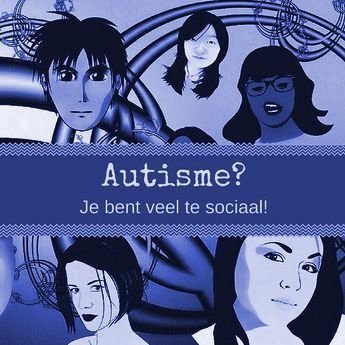
“I don’t notice that you have autism!” True, if you meet me you may not immediately recognize that I have ASD. I learned to hide that in my younger years. I already noticed that I was different from other people around me, or at least I suspected it. I couldn’t tell you exactly what it was in, but I was different. Looking back (after the diagnosis) there were of course leads. Things you think about now “Yes duh!” But that were not very recognizable. And why? Simple: social camouflage.
Camouflage?
Yes. The art of acting and socially desirable behavior exhibiting “because everyone around me does that”. I was not really aware that I was doing this. I watched how a group treated each other and tried to imitate it. Unfortunately, this often led in the past to fall outside the “cliques” and not able to connect with peers. Then it was striking for some people that I did find a connection with adults when I was young. But with peers I was often the odd man out.
At a later age I went more for myself. I knew I was different and embraced it. I only partially adapted, but still managed to uphold my social camouflage. People knew that I had strange ideas sometimes, but yeah, everyone had those sometimes. I myself did not really notice that I was doing this, putting on a mask to the outside world. I thought that I was strange and / or crazy, and since I could not solve that, I stated that as a fact about myself.
After the diagnosis
Once I knew I had Asperger’s syndrome, I started reading about it. So I found out that people with ASD camouflage themselves socially. They do this not to fall outside the groups. One is better at this than another. This also explained to me why ASD had not been diagnosed earlier in my life.
Maintaining the mask, or the camouflage, takes energy. And I sometimes have less of that than on other days. This also means that on some days I can do all kinds of social things well, while on other days I cannot keep up with the same things. This can be confusing for people. Sometimes this even encounters incomprehension. It is important to guard your limits and not to be sucked in situations where you pass yourself by. Unfortunately, this is difficult to recognize when it is a situation that you should not have done. This in turn leads to over-stimulation or sometimes even complete meltdowns.
Now that I have my diagnosis I can better explain to people how it works for me. That I have a limited amount of energy, which varies from day to day. That because of that sometimes I cancel and other days I have no problem doing more than the weeks before. Partly due to education, I learned not to always keep my mask on. By just showing what I encounter, or being able to explain my way of dealing with people, I give my environment the opportunity to take this into account. Whether they do that of course depends more on them than on me. I also learned to adapt to the people around me, without neglecting myself.
All in all it’s a hassle. Upholding the mask(s), applying camouflage, displaying socially acceptable behavior … Sometimes it is very tiring. But by communicating about this, the concept already improves a lot. And finally it starts there; understanding.